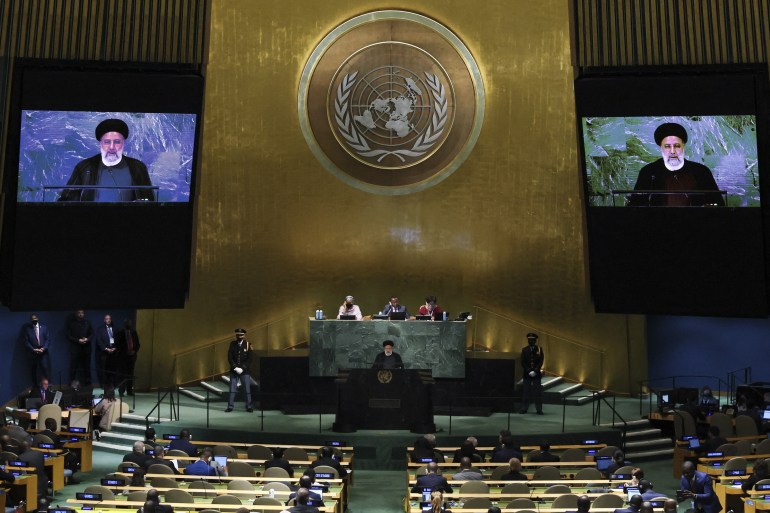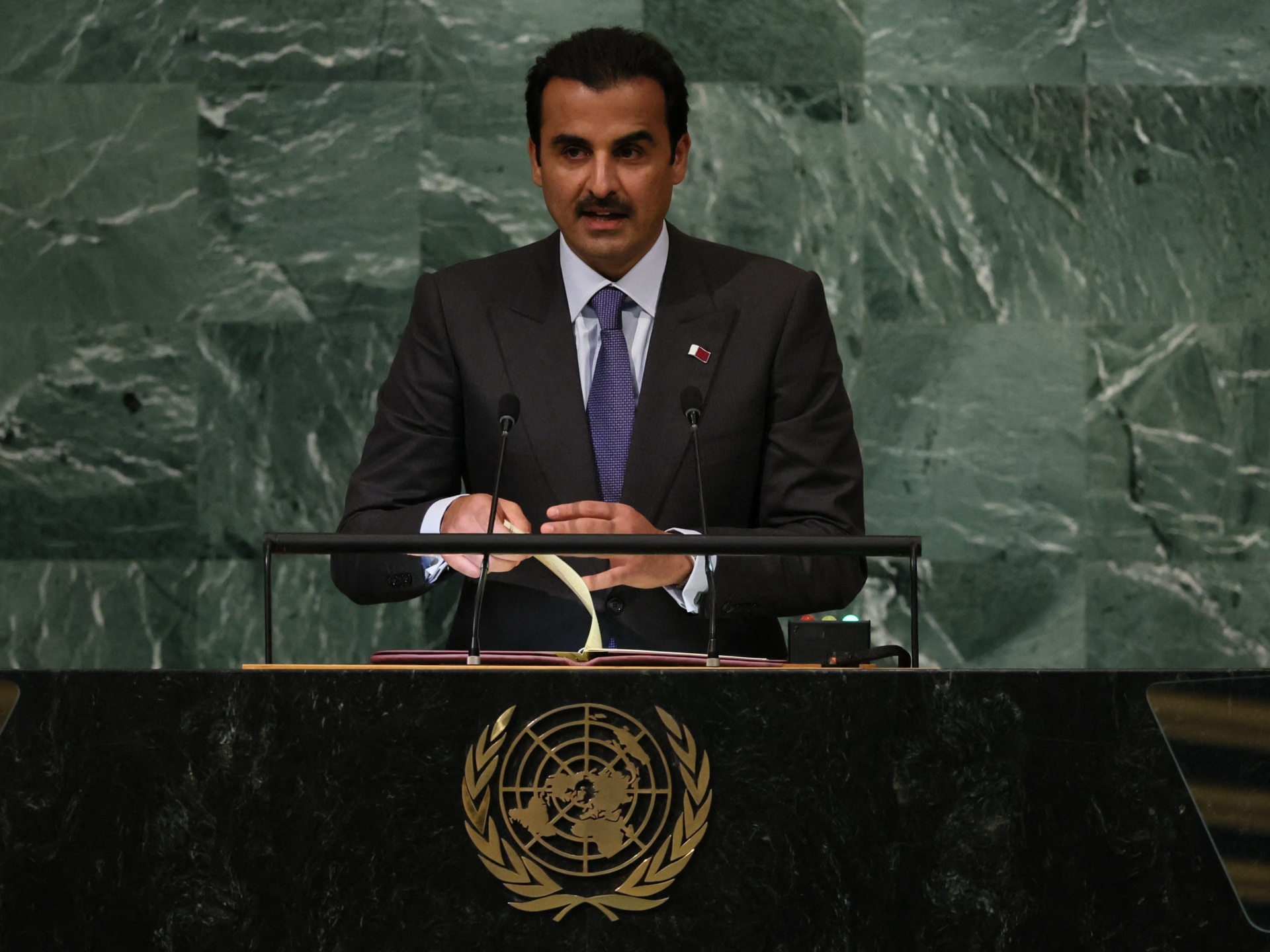Leaders from the Middle East gathered at the United Nations General Assembly (UNGA) commonly expressed concern about the Russian war on Ukraine and its consequences on global inflation, gas prices, and food – in addition to the fissures it opened among major powers in a way not seen since the Cold War.
The loss of important grain and fertiliser exports from Ukraine and Russia has triggered a food crisis, especially in developing countries, and inflation and a rising cost of living in many others.
Some of the Middle Eastern issues addressed these issues, but each also spoke of local or regional crises that have affected their countries in particular.
Jordan
King Abdullah II of Jordan said the pandemic, exacerbated by the crisis in Ukraine, has disrupted global supply chains and increased hunger.
Many well-off countries experiencing empty food shelves for the first time “are discovering a truth that people in developing countries have known for a long time – for countries to thrive, affordable food must get to every family’s table,” he said.
“On a global level, this demands collective measures to ensure fair access to affordable food, and speed the movement of staples to countries in need,” Abdullah said.
The monarch also spoke of the climate crisis and the need for “global partnerships” to affect change in an issue that has left a devastating impact on many countries.
“We see more opportunities to work with partners to preserve precious world heritage sites and natural wonders – the unique Dead Sea, the sacred Jordan River, and the resilient coral reefs of the Gulf of Aqaba – which are all threatened by climate change.”
Abdullah spoke of the refugee crisis in the Middle East. Jordan has historically welcomed refugees fleeing wars in neighbouring countries, including Iraqis and Syrians. He specifically referred to Palestinian refugees, whose rights, he said, should be supported to ensure “that Palestinian refugee children have schools to go to, and access to appropriate medical care.”
Jerusalem, its Muslim and Christian holy sites, was also a key part of the king’s speech.
Jordan has been the official custodian of Christian and Muslim holy places in Jerusalem since 1924 and ensuring the status quo in the holy city, especially at the Al Aqsa Mosque compound, has been a contentious issue discussed among Israeli and Jordanian officials.
“Today, the future of Jerusalem is an urgent concern. The city is holy to billions of Muslims, Christians, and Jews around the world. Undermining Jerusalem’s legal and historical status quo triggers global tensions and deepens religious divides,” he said.
“Today, Christianity in the Holy City is under fire. The rights of churches in Jerusalem are threatened. This cannot continue. Christianity is vital to the past and present of our region and the Holy Land. It must remain an integral part of our future.”

Qatar
The emir of Qatar has said that the UN Security Council must compel Israel to end its occupation of Palestinian territories.
In his speech before the General Assembly, Sheikh Tamim bin Hamad Al Thani said, “The Security Council must shoulder its responsibility and must compel Israel to end the occupation of Palestinian territories and to establish a Palestinian state along the borders of 1967 with East Jerusalem as its capital.”
The emir warned that “failure to implement international resolutions and in light of the continuous change of the situation on the ground, the occupation and its settlement activities is pursuing a policy of fait accompli”.
“This will change the rules of the conflict and will change the format of solidarity in the future. At this juncture, I stress that we stand in full solidarity with the brotherly Palestinian people in its aspiration to achieve justice,” he said.
The Qatari emir spoke on a number of regional issues such as conflicts in Libya, Yemen and Syria.
He backed the revival of Iran nuclear agreement, saying “it would be in the interest of the security and stability of the region.”
Sheikh Tamim used the occasion to welcome the world in November for the FIFA World Cup.
“In this tournament, which will be held for the first time in an Arab Muslim country, and for the first time in the Middle East in general, the world will see that one of the small- and medium-size countries is able to host global events with exceptional success, in addition to its ability to provide a spacious ambience for diversity and constructive interaction between peoples,” he said.
Turkey
Turkish President Recep Tayyip Erdogan emphasised to world leaders at the UN headquarters the need for a peaceful solution to the war on Ukraine, stopping short of providing any tangible steps.
“That may not necessarily be reflective of Turkey’s shortcomings, in so much as it is a fact of where we are right now, where nobody or country has been able to find practical steps to put an end to this war,” said Al Jazeera correspondent Jamal Elshayyal.
“That said, maybe Ankara’s position is a lot more promising than others in that it has succeeded in finding common ground to some of the knock-on effects of this war, particularly with regards to food security and the global supply chain of grain and other important things coming out of there,” he added.
Erdogan did not limit his speech to the war on Ukraine; he also spoke about other conflicts, most recently the one between Azerbaijan and Armenia, Libya, Iraq, Syria, as well as other challenges facing the world.
“But ultimately Erdogan’s main message to delegates was one of seeking support for his country’s attempt at conflict resolution,” Elshayyal said.
Erdogan also made a renewed emphasis on the need for the UN to reform itself, “highlighting his position that the world is greater than five, referencing the five permanent members of the UN Security Council and how it is unfair and unjust that they have veto power over many significant decisions that impact billions of people around the world”.
Iran
In his speech on Wednesday, Iranian President Ebrahim Raisi said Tehran is not seeking nuclear weapons and is serious about reviving a nuclear deal formally known as the Joint Comprehensive Plan of Action (JCPOA).
“Our wish is only one thing: observance of commitments,” he said.
He demanded guarantees that the United States will not again abandon Tehran’s 2015 nuclear deal with major powers, as it did under former President Donald Trump’s administration in 2018.
“We have before us the experience of America’s withdrawal from the [deal],” Raisi said at the UN General Assembly. “With that experience and this perspective, can we ignore the important issue of guarantees for a durable agreement?”
Raisi also called for Trump to face trial for the 2020 assassination of Iran’s General Qassem Soleimani, who headed the elite Quds Force of the Islamic Revolutionary Guard Corps (IRGC), in a US drone attack.
The Iranian president also sought to deflect criticism of last week’s death of 22-year-old Mahsa Amini in custody, which has unleashed protests across several cities.
“The Islamic Republic of Iran rejects some of the double standards of some governments vis-a-vis human rights,” Raisi said. “[So long as] we have this double standard where attention is solely focused on one side and not all equally, we will not have true justice and fairness.
“Human rights belong to all, but unfortunately, it is trampled upon by many governments,” he added, referring to the discovery of unmarked graves of Indigenous people in Canada, the suffering of the Palestinians, and images of migrant children held in cages in the United States.
